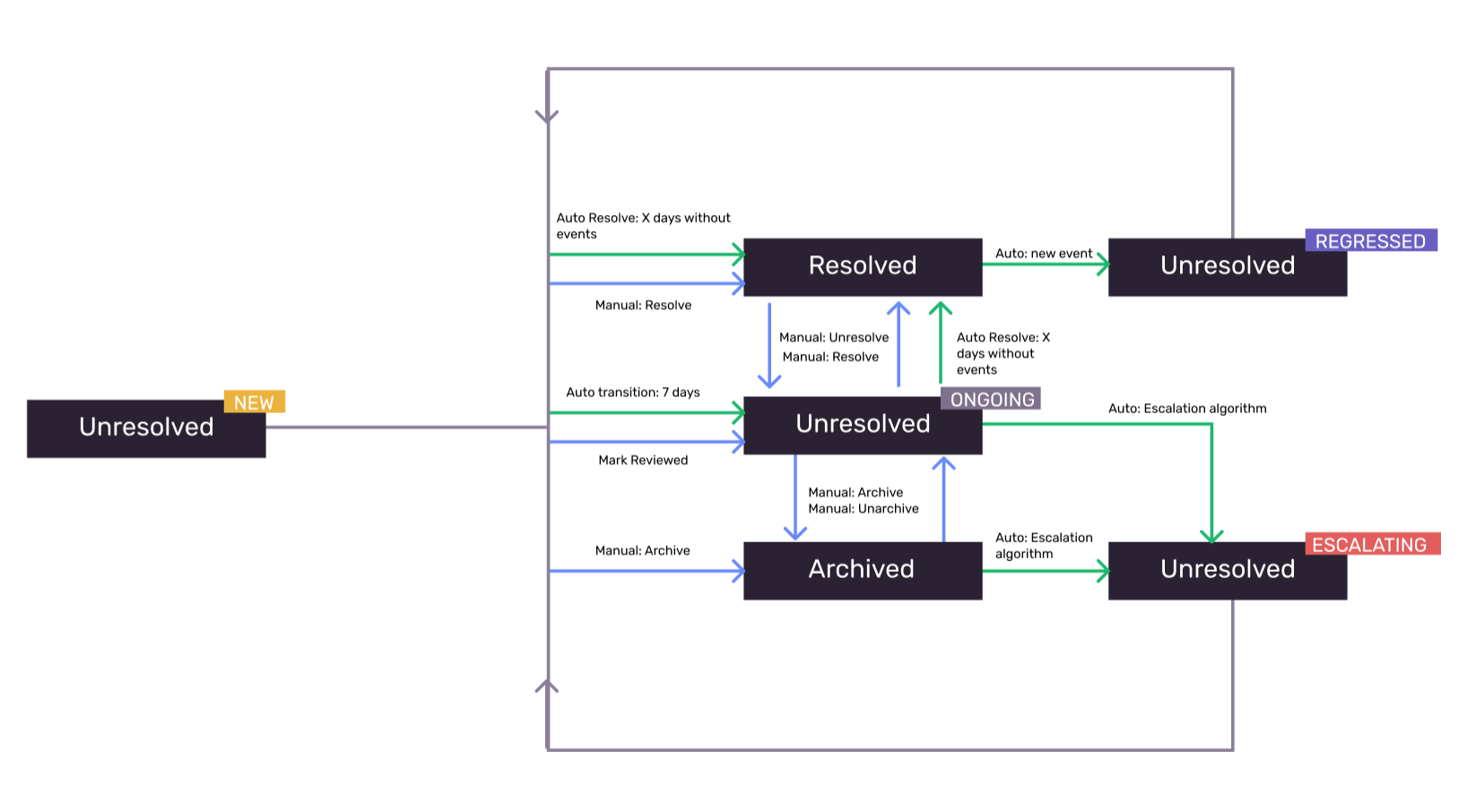Issue Status
Learn how issue status works and and how to triage issues.
Use the status tags attached to issues on the Issues page in Sentry to help you triage and prioritize problems with your application that are important to you. Keep in mind that an issue can only have one status at a time.
Here's a list of all statuses, how they're assigned to an issue, and their custom search term:
| Status | Condition | Custom Search Term |
|---|---|---|
| New | An issue that was created in the last 7 days. | is:new |
| Ongoing | An issue that was created more than 7 days ago or has manually been marked as reviewed. | is:ongoing |
| Escalating | An issue that's exceeded its forecasted event volume. For more details, see Escalating Issues Algorithm. Please note that escalating issues currently does not work for merged/unmerged issues. | is:escalating |
| Regressed | A resolved issue that's come up again. | is:regressed |
| Archived | An issue that's been marked as archived. | is:archived |
| Resolved | An issue that's been marked as fixed. | is:resolved |
The diagram below shows how the statuses are updated automatically and manually:
One way to limit the issues that you see is by selecting a tab at the top of the Issues page. On the “Unresolved" tab, you'll find New, Ongoing, Escalating, and Regressed issues. You can also narrow down further by choosing the "For Review", "Regressed", "Escalating", or "Archived" tabs.
While some issue statuses are added and updated automatically, you can manually Archive or Resolve an issue, which will also change its status and remove it from the is:for_review list. Items in the is:for_review list are new, regressed, or unresolved issues that haven't been reviewed yet.
Archive an issue to move it out of the issue stream and pause alerts on it until the issue gets worse. Archiving makes sense for noisy issues that are less pressing or not applicable to you or your team. Archiving changes the issue status to Archived and moves the issue from "Unresolved" into the "Archived" tab.
Sentry will automatically bring an issue back to the top of the list and change its status to Escalating if the events in that issue significantly increase over a short period of time. To learn more about how this works, see Escalating Issues Algorithm. By default, issues are archived until escalating. There's also an option to mark an issue as Archived for:
- Forever
- A set period of time
- Until it occurs a set number of times
- Until a set number of users are affected
If you archive an issue "Forever", events connected with that issue will continue to be recorded, but the issue will never be labeled as escalating even if it meets escalating conditions. You can still unarchive any archived issue, including those that have been archived "Forever". All unarchived issues will then show up in the "Unresolved" tab.
You can manually mark an issue as Resolved when it’s been fixed. You can also specify further by resolving it in:
- Your next release
- A current release
- Another release
or
If the same issue comes back, its status will automatically change to Regressed.
You can remove an issue from the issue list by deleting it, but it will reappear as a new issue if it recurs.
There's also an option to Delete and Discard Forever, which will make it so that the issue is never seen again, even if it recurs. Any future events tied to the permanently deleted issue will be discarded automatically and won't count towards your quota.
You can only delete Error Issues. Other issue categories, such as Performance Issues, don't support this feature.
Our documentation is open source and available on GitHub. Your contributions are welcome, whether fixing a typo (drat!) or suggesting an update ("yeah, this would be better").
